30 sept 2018
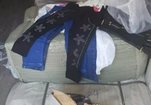
Israeli occupation authorities have reportedly seized a number of large containers of children’s clothing while on their way to the besieged Gaza Strip, claiming they were to be used for terrorist acts, Israeli media reported on Saturday.
According to Israeli news site Ynet, Israeli Defense Minister Avigdor Lieberman said that confiscating the clothing is part of the Israeli war on “Palestinian terror.”
He claimed that the containers of children’s clothing, were intended for Gaza merchants who planned to pay the revenues for Hamas.
“Of course, this is a big lie,” a Gaza merchant told Days of Palestine. “This is just a false claim in order to the justify the 12-year-old Israeli siege imposed on the coastal enclave.”
At the beginning of the school year, Palestinian families in Gaza were unable to find school uniforms in the Gaza markets, for their children.
The merchant said that the Israeli occupation blocked tens of items of children’s clothes, including school uniforms.
“Even socks did not exist in the markets,” Sarah, a mother of three school boys, said. “I bought shoes for my kids, and they have been wearing them without socks,” she said.
According to Israeli news site Ynet, Israeli Defense Minister Avigdor Lieberman said that confiscating the clothing is part of the Israeli war on “Palestinian terror.”
He claimed that the containers of children’s clothing, were intended for Gaza merchants who planned to pay the revenues for Hamas.
“Of course, this is a big lie,” a Gaza merchant told Days of Palestine. “This is just a false claim in order to the justify the 12-year-old Israeli siege imposed on the coastal enclave.”
At the beginning of the school year, Palestinian families in Gaza were unable to find school uniforms in the Gaza markets, for their children.
The merchant said that the Israeli occupation blocked tens of items of children’s clothes, including school uniforms.
“Even socks did not exist in the markets,” Sarah, a mother of three school boys, said. “I bought shoes for my kids, and they have been wearing them without socks,” she said.
29 sept 2018
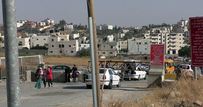
Israeli occupation forces (IOF) on Saturday morning closed the main entrance to al-Fawwar refugee camp in al-Khalil, south of the West Bank.
The PIC reporter said that the abrupt closure has disturbed the life of about 10,000 Palestinians living in the camp, adding that hundreds of cars are stuck on both sides of the entrance waiting to be allowed in or out.
Businessmen, merchants, workers and university students were harassed and searched by the IOF soldiers who installed a military checkpoint near the entrance.
Tension has flared up in the refugee camp since Friday night when the IOF stormed the camp and attacked Palestinian citizens who responded by throwing stones, empty bottles, and Molotov cocktails. No arrests have been reported so far.
The PIC reporter said that the abrupt closure has disturbed the life of about 10,000 Palestinians living in the camp, adding that hundreds of cars are stuck on both sides of the entrance waiting to be allowed in or out.
Businessmen, merchants, workers and university students were harassed and searched by the IOF soldiers who installed a military checkpoint near the entrance.
Tension has flared up in the refugee camp since Friday night when the IOF stormed the camp and attacked Palestinian citizens who responded by throwing stones, empty bottles, and Molotov cocktails. No arrests have been reported so far.
28 sept 2018

The Israeli army announced, Friday, the closure and siege on a Palestinian Bedouin community, in northern Jordan Valley of the occupied West Bank, so that groups of illegal colonialist settlers can tour in the area.
The military ordered a siege on Khallet Hamad from eight in the morning, until six in the evening, Friday.
Local sources said groups of colonialist settlers, accompanied by soldiers, have already started their “tours” in the area, while the villagers were not allowed to leave their community.
The sources added that such activities have been carried out several times lately, while the Palestinian shepherds were unable to even take their sheep to grazing areas.
It is worth mentioning that, two years ago, Israel built an illegal colony on Palestinian lands near the community.
The military ordered a siege on Khallet Hamad from eight in the morning, until six in the evening, Friday.
Local sources said groups of colonialist settlers, accompanied by soldiers, have already started their “tours” in the area, while the villagers were not allowed to leave their community.
The sources added that such activities have been carried out several times lately, while the Palestinian shepherds were unable to even take their sheep to grazing areas.
It is worth mentioning that, two years ago, Israel built an illegal colony on Palestinian lands near the community.
27 sept 2018
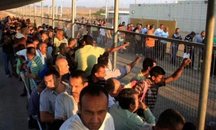
Over the past two years, more than 2,000 people have been impacted by a decision to revoke entry permits to Israel, from Palestinians who share a name with someone who has carried out a resistance attack.
A report by Hebrew channel Social TV revealed, this week, that since 2016, thousands of Palestinian workers from the West Bank, many of whom have worked in Israel for over 20 years, have had their entry denied overnight, rendering them jobless.
When the reason for the refusal is requested, Israeli authorities state that it is due to a shared family name with a suspected resistance attacker, even if no actual familial connection exists between the two parties. The move has impacted hundreds of people with common Palestinian names.
“It could be hundreds or thousands of people for that matter,” Yoav Gal Tamir of the workers Advice Centre, which represents Palestinian workers, said. “It is as if cancelling the entry permit for someone called Cohen, when someone else called Cohen did something wrong.”
Whilst Israel regularly implements such a policy on the direct family members of resistance attackers, usually for the space of a year, some of the recent permit refusals have been found to state their expiry date as 100 years from the time of issuance, effectively barring Palestinians from exiting the West Bank for life.
With unemployment in the occupied territories high and wages low, the latest refusals have increased the financial strain on hundreds of families, many of whom have numerous dependents to support. Palestinians have argued that this only increases the likelihood of resistance attacks against Israeli forces, as young men feel hopeless at the prospect of continued economic hardship for their families.
“Take a balloon. If you keep blowing into a balloon, how long will it last? In the end, it will explode. We are fed up and waiting to explode. We want to work, we have family responsibilities,” Kaher Al-Jamal, a Beit Surik resident who previously worked as a gardener in Israel, said.
The prevention of Palestinian employees crossing the border has also caused concern among Israeli companies which require workers, particularly in the field of construction. Some Israeli contractors have raised the issue with border administration officials, but to no avail.
Many Palestinians have attempted to address their exclusion through legal channels. Whilst the Israeli authorities have defended their right to block entry to those deemed a security threat, many have found their permit reinstated prior to scheduled court dates, according to Attorney Tamir Blank, suggesting that authorities wish to avoid hearings on the issue.
The Israeli High court has ruled that measures that constitute collective and arbitrary punishment are illegal, but occupation forces have otherwise been permitted to carry out such actions with impunity.
~ Middle East Monitor/Days pf Palestine
Opinion/Analysis 09/21/18: Alt-Right March for Israel, Human Rights Activist Smeared as Anti-Semitic
A report by Hebrew channel Social TV revealed, this week, that since 2016, thousands of Palestinian workers from the West Bank, many of whom have worked in Israel for over 20 years, have had their entry denied overnight, rendering them jobless.
When the reason for the refusal is requested, Israeli authorities state that it is due to a shared family name with a suspected resistance attacker, even if no actual familial connection exists between the two parties. The move has impacted hundreds of people with common Palestinian names.
“It could be hundreds or thousands of people for that matter,” Yoav Gal Tamir of the workers Advice Centre, which represents Palestinian workers, said. “It is as if cancelling the entry permit for someone called Cohen, when someone else called Cohen did something wrong.”
Whilst Israel regularly implements such a policy on the direct family members of resistance attackers, usually for the space of a year, some of the recent permit refusals have been found to state their expiry date as 100 years from the time of issuance, effectively barring Palestinians from exiting the West Bank for life.
With unemployment in the occupied territories high and wages low, the latest refusals have increased the financial strain on hundreds of families, many of whom have numerous dependents to support. Palestinians have argued that this only increases the likelihood of resistance attacks against Israeli forces, as young men feel hopeless at the prospect of continued economic hardship for their families.
“Take a balloon. If you keep blowing into a balloon, how long will it last? In the end, it will explode. We are fed up and waiting to explode. We want to work, we have family responsibilities,” Kaher Al-Jamal, a Beit Surik resident who previously worked as a gardener in Israel, said.
The prevention of Palestinian employees crossing the border has also caused concern among Israeli companies which require workers, particularly in the field of construction. Some Israeli contractors have raised the issue with border administration officials, but to no avail.
Many Palestinians have attempted to address their exclusion through legal channels. Whilst the Israeli authorities have defended their right to block entry to those deemed a security threat, many have found their permit reinstated prior to scheduled court dates, according to Attorney Tamir Blank, suggesting that authorities wish to avoid hearings on the issue.
The Israeli High court has ruled that measures that constitute collective and arbitrary punishment are illegal, but occupation forces have otherwise been permitted to carry out such actions with impunity.
~ Middle East Monitor/Days pf Palestine
Opinion/Analysis 09/21/18: Alt-Right March for Israel, Human Rights Activist Smeared as Anti-Semitic
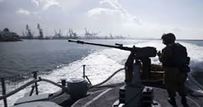
Israeli gunboats on Thursday morning attacked Palestinian fishermen off the northern shores of the besieged Gaza Strip.
Fishermen reported that two gunboats intercepted fishing boats off the coast of Beit Lahia before soldiers aboard them started to open machinegun fire around them.
They added that the naval forces prevented the fishermen from sailing beyond three nautical miles in Gaza waters.
Fishermen reported that two gunboats intercepted fishing boats off the coast of Beit Lahia before soldiers aboard them started to open machinegun fire around them.
They added that the naval forces prevented the fishermen from sailing beyond three nautical miles in Gaza waters.
26 sept 2018
|
|
Farmers in the besieged Gaza Strip have harvested 12,000 tons of dates from their palm trees; however, they are struggling to find buyers for their produce.
High unemployment and rising poverty rates mean that locals in the Strip are unable to buy the fruit, while the Israeli siege has limited the farmers’ abilities to export their crop. Farmer Mohammed Barka, 28, told Anadolu Agency that his yield is abundant and good this year, but the deteriorating economic condition in Gaza has caused people to buy less. “Despite the low prices of the product, the demand is still low,” he explained. |
Baraka, who has been working in this profession for ten years, called on the Ministry of Agriculture to work to export the produce out of Gaza.
In a report published yesterday the World Bank warned that the enclave is “collapsing”, due to the 11-year Israeli-led blockade, and described the economy as being in “free fall”, with aid flows no longer enough to stimulate growth.
“The result is an alarming situation with every second person living in poverty and the unemployment rate for its overwhelmingly young population at over 70 per cent,” it added.
“The production of dates amounted this year to 12,000 tonnes,” said Tahsin Al-Sakka, director general of marketing and coordination at the Palestinian Ministry of Agriculture in Gaza.
“This quantity is enough for the Strip’s needs and exports also, but poor purchasing [power of the local population] leaves them stacked up in the market.”
A week ago, farmers exported 12 tonnes of dates to the West Bank, Al-Sakka said.
“We hope that we will be able to export significant quantities of dates outside the Strip.”
The total amount of dates exported last year reached 400 tonnes, he added.
In a report published yesterday the World Bank warned that the enclave is “collapsing”, due to the 11-year Israeli-led blockade, and described the economy as being in “free fall”, with aid flows no longer enough to stimulate growth.
“The result is an alarming situation with every second person living in poverty and the unemployment rate for its overwhelmingly young population at over 70 per cent,” it added.
“The production of dates amounted this year to 12,000 tonnes,” said Tahsin Al-Sakka, director general of marketing and coordination at the Palestinian Ministry of Agriculture in Gaza.
“This quantity is enough for the Strip’s needs and exports also, but poor purchasing [power of the local population] leaves them stacked up in the market.”
A week ago, farmers exported 12 tonnes of dates to the West Bank, Al-Sakka said.
“We hope that we will be able to export significant quantities of dates outside the Strip.”
The total amount of dates exported last year reached 400 tonnes, he added.
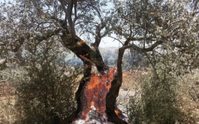
An Israeli settlement guard, Wednesday, set fire to Palestinian-owned agricultural land planted with olive trees in the town of al-Lubban al-Sharqiya, to the south of Nablus, in the northern occupied West Bank, said a local official.
The village mayor Samer Awais said, according to WAFA, that a security guard from the settlement of Eli, built illegally on Palestinian land, set ablaze four dunams of agricultural land located at the entrance of the town and adjacent to the Ramallah-Nablus road, burning dozens of olive trees.
The town residents and with the help of fire crews were able to put out the fire, he said.
The village mayor Samer Awais said, according to WAFA, that a security guard from the settlement of Eli, built illegally on Palestinian land, set ablaze four dunams of agricultural land located at the entrance of the town and adjacent to the Ramallah-Nablus road, burning dozens of olive trees.
The town residents and with the help of fire crews were able to put out the fire, he said.
25 sept 2018
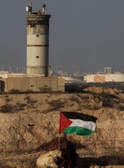
Israeli soldiers shot, on Tuesday evening, five Palestinians in the Great Return Camp, east of Khuza’a town, east of Khan Younis, in the southern part of the Gaza Strip and near Jabalia, in northern Gaza.
The Palestinian Health Ministry in Gaza has reported that two Palestinians were injured, including one who suffered a very serious gunshot wound to the head in northern Gaza, and were rushed to the Indonesian hospital, east of Jabalia.
Dr. Ashraf al-Qedra, the spokesperson of the Health Ministry in Gaza, said the Palestinian, who was shot in the head, was later rushed to the Shifa Medical Center, due to the seriousness of his condition.
It added that the soldiers shot two Palestinians near Khuza’a town, east of Khan Younis, and one who was shot with a gas bomb in his head, east of Gaza city.
Protests were held along the eastern border areas along the Gaza Strip, including Khan Younis, al-Boreij in central Gaza, and Jabalia, in northern Gaza.
The protesters burnt tires, and used laser pointers directly at Israeli military sniper posts, while the soldiers fired live rounds, in addition to high-velocity gas bombs and concussion grenades.
Furthermore, the Israeli Navy fired many live rounds at Palestinian fishing boats, near the shore of Gaza city, causing no damage or injuries.
Israel also is threatening to reduce the fishing zone from six nautical miles to three, if the protests continue.
The Palestinian Health Ministry in Gaza has reported that two Palestinians were injured, including one who suffered a very serious gunshot wound to the head in northern Gaza, and were rushed to the Indonesian hospital, east of Jabalia.
Dr. Ashraf al-Qedra, the spokesperson of the Health Ministry in Gaza, said the Palestinian, who was shot in the head, was later rushed to the Shifa Medical Center, due to the seriousness of his condition.
It added that the soldiers shot two Palestinians near Khuza’a town, east of Khan Younis, and one who was shot with a gas bomb in his head, east of Gaza city.
Protests were held along the eastern border areas along the Gaza Strip, including Khan Younis, al-Boreij in central Gaza, and Jabalia, in northern Gaza.
The protesters burnt tires, and used laser pointers directly at Israeli military sniper posts, while the soldiers fired live rounds, in addition to high-velocity gas bombs and concussion grenades.
Furthermore, the Israeli Navy fired many live rounds at Palestinian fishing boats, near the shore of Gaza city, causing no damage or injuries.
Israel also is threatening to reduce the fishing zone from six nautical miles to three, if the protests continue.
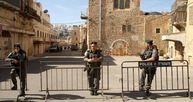
Israeli occupation authorities on Tuesday closed the Ibrahimi Mosque in al-Khalil city for Jewish holidays.
Hefzi Abu Sneineh, who is in charge of the Ibrahimi Mosque, said that the Israeli authorities decided to close the Mosque and ban Adhan (call of prayer) on Tuesday and Wednesday for Sukkot holiday.
Abu Sneineh told Quds Press that such closures, which are usually approved by Shamgar Committee which was formed following the Ibrahimi Mosque massacre in 1994, are a blatant aggression on the sanctity of the Islamic site.
In a related context, the Israeli army deployed its forces in Bab al-Zawiya area in the center of al-Khalil city and forced Palestinian citizens to close their shops to secure a settler break-in into a nearby archaeological site.
Hefzi Abu Sneineh, who is in charge of the Ibrahimi Mosque, said that the Israeli authorities decided to close the Mosque and ban Adhan (call of prayer) on Tuesday and Wednesday for Sukkot holiday.
Abu Sneineh told Quds Press that such closures, which are usually approved by Shamgar Committee which was formed following the Ibrahimi Mosque massacre in 1994, are a blatant aggression on the sanctity of the Islamic site.
In a related context, the Israeli army deployed its forces in Bab al-Zawiya area in the center of al-Khalil city and forced Palestinian citizens to close their shops to secure a settler break-in into a nearby archaeological site.
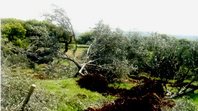
Israeli settlers, on Tuesday, uprooted at least half a dozen fruitful olive trees in al-Hamra area, south of Hebron, in the occupied West Bank, said a local activist.
The popular committee coordinator in Yatta, Rateb al-Jabour, told WAFA that settlers from the Israeli settlements of Ma’on and Havat Ma’on, built illegally on Yatta town land, in Hebron, uprooted around six fruitful olive tress belonging to two local residents who were identified as Salameh and Ibrahim Rabee.
Such actions are routinely carried out by Israeli extremists, in the occupied West Bank, with no intervention from law enforcement officials.
The popular committee coordinator in Yatta, Rateb al-Jabour, told WAFA that settlers from the Israeli settlements of Ma’on and Havat Ma’on, built illegally on Yatta town land, in Hebron, uprooted around six fruitful olive tress belonging to two local residents who were identified as Salameh and Ibrahim Rabee.
Such actions are routinely carried out by Israeli extremists, in the occupied West Bank, with no intervention from law enforcement officials.
24 sept 2018
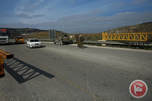
The Israeli authorities declared an 8-day closure on the occupied West Bank and the besieged Gaza Strip starting late Sunday until next Monday, the first of October, for the Jewish holiday of Sukkot.
The Israeli army spokesperson confirmed that the closure will be lifted off the West Bank on Monday, September 24th night but would be imposed again on Thursday night until October 1st.
Crossings with the Gaza Strip would remain closed until October 1st.
This is the third closure imposed on the West Bank and Gaza in the month of September, first for Rash Hashanah known as the Jewish new year, Yom Kippur also known as Day of Atonement and currently for Sukkot, otherwise known as the Feast of Tabernacles.
Israel regularly imposes closures on the West Bank and Gaza for Jewish holidays, but week-long festivals like Sukkot usually only have closures imposed at the end of the holiday, lasting a few days.
Severe restrictions on movement for Palestinians are typically implemented by Israeli authorities during Jewish holidays for alleged security purposes, accompanied by increased tensions around the Al-Aqsa Mosque compound.
Israel's imposition of closures on the Palestinian territory has severely affected the livelihoods of Palestinians who depend on entering Israel, or its illegal settlements, for employment opportunities, medical care and other reasons. Such policies have been strongly criticized by rights groups for amounting to collective punishment.
The Israeli army spokesperson confirmed that the closure will be lifted off the West Bank on Monday, September 24th night but would be imposed again on Thursday night until October 1st.
Crossings with the Gaza Strip would remain closed until October 1st.
This is the third closure imposed on the West Bank and Gaza in the month of September, first for Rash Hashanah known as the Jewish new year, Yom Kippur also known as Day of Atonement and currently for Sukkot, otherwise known as the Feast of Tabernacles.
Israel regularly imposes closures on the West Bank and Gaza for Jewish holidays, but week-long festivals like Sukkot usually only have closures imposed at the end of the holiday, lasting a few days.
Severe restrictions on movement for Palestinians are typically implemented by Israeli authorities during Jewish holidays for alleged security purposes, accompanied by increased tensions around the Al-Aqsa Mosque compound.
Israel's imposition of closures on the Palestinian territory has severely affected the livelihoods of Palestinians who depend on entering Israel, or its illegal settlements, for employment opportunities, medical care and other reasons. Such policies have been strongly criticized by rights groups for amounting to collective punishment.
Page: 32 - 31 - 30 - 29 - 28 - 27 - 26 - 25 - 24 - 23 - 22 - 21 - 20 - 19 - 18 - 17 - 16 - 15 - 14 - 13 - 12 - 11
